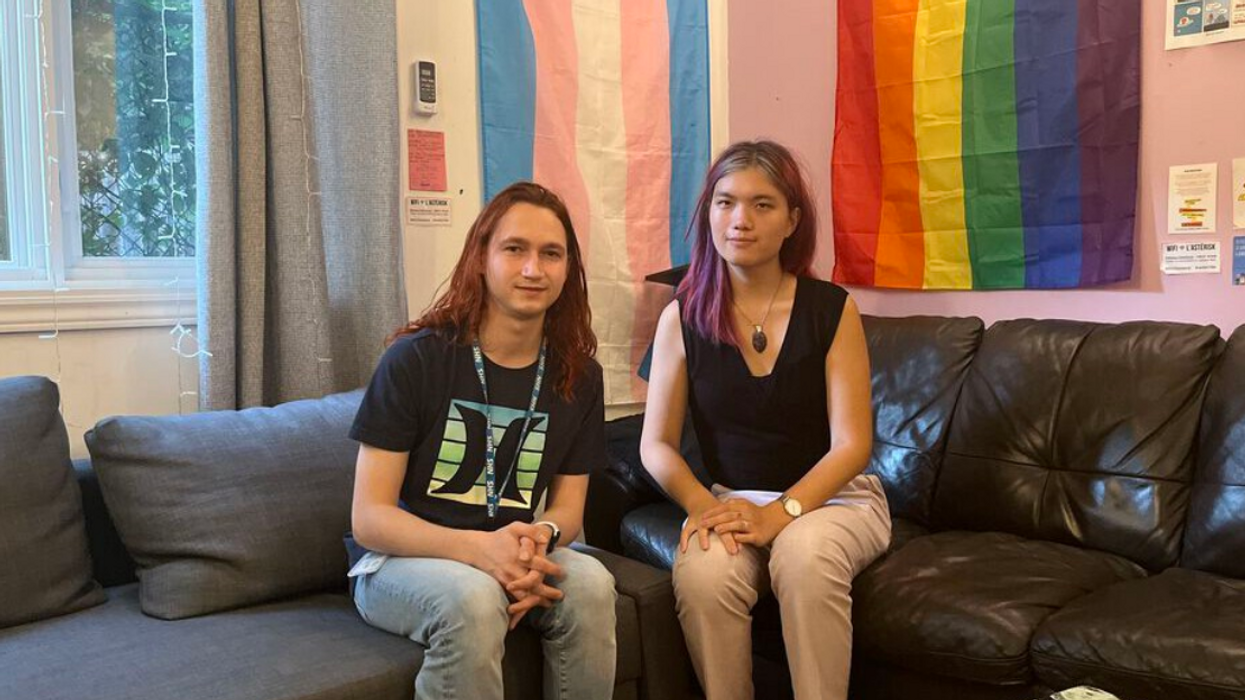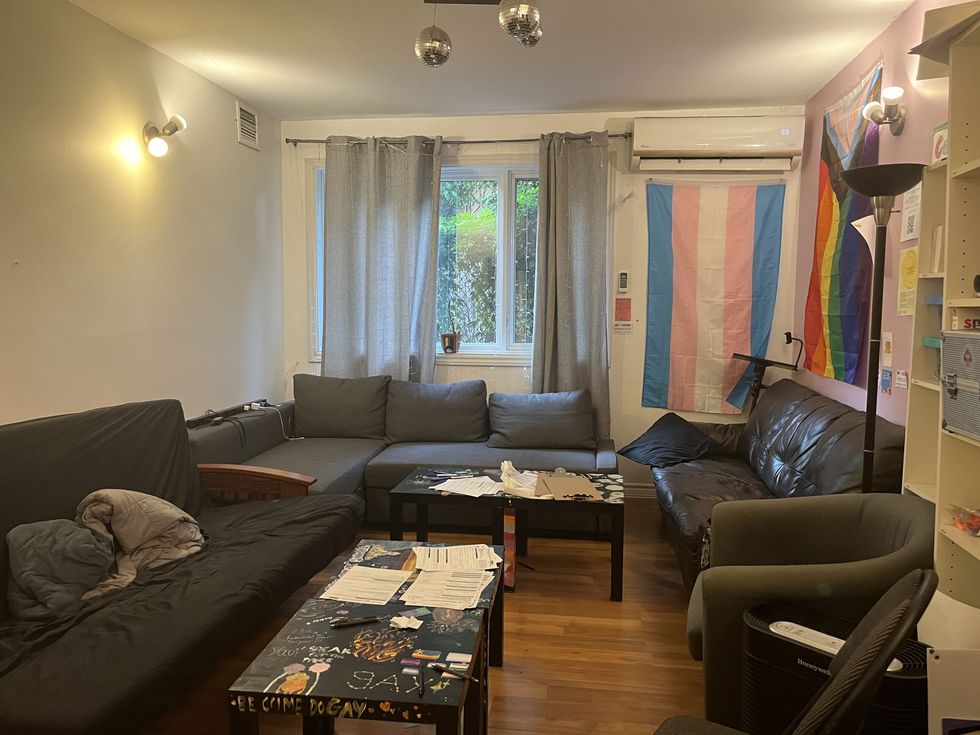How A Simple Act of Paperwork In Montreal Is Changing People's Lives
It's more than a bureaucratic nightmare: it's a matter of life and death.

Arwyn Thales, left, and Celeste Trianon, right, sit on couches at the Montreal Trans ID clinic.
The opinions expressed in this article are the author's own and do not necessarily reflect the views of Narcity Media.
Being trans is hard. Being trans in Quebec is even harder.
Trans people here face challenges throughout their lives due to one devastatingly simple yet unbelievably complicated barrier: having the wrong gender marker or legal name is a bureaucratic nightmare to fix.
But there’s hope, and it comes in the form of young activist and law student Celeste Trianon. Her walk-in Trans ID clinic helps trans people of all ages file their paperwork to change their legal IDs, free of charge (you can donate to Trianon, though, if you want, to help her afford administrative fees).
This legal clinic — which, to be clear, is not government-affiliated at all — was responsible for between 40% and 50% of the name and gender marker change requests processed by Quebec in the last year, according to Trianon and cross-referenced with numbers unearthed by the CBC.
I visited the clinic on August 22 at its Montreal location, nestled within the cozy walls of queer youth organization Jeunesse Lambda’s offices in the Village, to see what this process is actually like.
Visiting the Trans ID Clinic
When I arrived, Trianon was masked up, stamping documents with her signature and flitting from table to table, hair flashing like the wings of a pink and purple bird.
It was mostly quiet, with some chatter bleeding in from the other rooms — a group of queers were playing a tabletop RPG.
The room was full to bursting with more than a dozen trans people and their loved ones, clutching their IDs, proofs of address, and other necessary documents that needed to be photocopied, collated, and reviewed. The guiding forces in the space were Trianon and Arwyn Thales, Trianon’s partner in non-crime and the clinic’s sole other volunteer, the duo who orchestrate the entire process.
I sat on a stool in the corner, drinking in the stress in the room, heavy with the knowledge that, though I’m also trans, I wasn’t here to do this personal, fraught and necessary work that is so painfully bureaucratic that it literally takes a village.
In this room, histories are rewritten and lives are redirected, elbow to elbow with fellow trans people seeking to change their lives in what would typically be a private affair.
Trianon exuded both professionalism and compassion, a figure of hope against the backdrop of governmental indifference — and at times, outright animosity. She moved fluidly from tasks of administrative rigour into delicate conversations with often-shy attendees, talking to them openly and with quiet friendliness.
A chosen family affair, a legal fiction
Each person actually seeking a name or gender marker change has to bring a witness, someone who’s known them for at least a year and who can attest to the necessity of these changes in their life. Some bring family, but most (nearly all) bring friends.
Trianon ran in and out of the room, collecting printouts from the office, explaining forms and checking on each visitor. In this room, she also acts as a Commissioner for Oaths, a Quebec legal role that is a level below being a notary. She still hadn’t even noticed I was there.
"Everything is fiction, you know?" she said to a trans person hoping to change the sex on their birth certificate. Her clinic sets out to rewrite the elaborate, painstaking legal fiction that tangles people’s lived realities with letters and names that don’t fit them anymore if they ever really did in the first place.
The clinic was pretty peaceful when it wasn’t busy, but that’s just because everyone in the room was focused on doing this goddamn paperwork, doing it right, so they never have to do it again.
In the other room, someone was building their roleplaying character.
“I’m stressed that you can’t change it back,” a clinic attendee said. They were referring to their gender marker, which is irreversible once changed, according to Quebec legislation. That means you can't change your mind, you can't afford to be equivocal and, crucially, you can't go back into the closet.
Trianon darted back into the room to keep helping. Someone had to email her an identifying document. Then, another person had a question — a family member of a trans person, filling out a complicated form.
She switched between French and English seamlessly as she hurried to help as many people as she could in the limited time she had. It must be gruelling, I thought.
The stakes have always been high
If Trianon doesn’t show people how to fill these forms out correctly, it’s not just her reputation on the line — it’s the life and safety of a fellow trans person.
Someone mentioned that they were grateful the CBC wasn't there, with imposing cameras and reporters filling the intimate space. The outlet covered the clinic in July. I hadn’t identified myself as a journalist yet, and the comment made me self-conscious.
But nothing in this piece is identifying. You’ll never find out who was there with me that day because they deserve better than to be forced into any public eye for just seeking the normalcy and validation gifted to cis people at birth.
They were my brothers and sisters, my siblings. I feel protective over them, with their piles of sensitive, identifying documents, including, for some, original copies of their birth certificate, multiple proofs of address, and reference letters from health and social service professionals.
I introduced myself to Thales and then Trianon, who shared that I’m a journalist. Instantly, the air in the room turned cold.
I made a little speech about being a journalist and not taking down any identifying information, but also about being trans and how I "get it." I hoped, and still hope, it made at least someone feel better about me being in the room.
Helping everyone, no matter how long it takes
The room slowly emptied as people completed their paperwork, sealing it in large envelopes to send to the one person (a woman, I learn) who actually processes all of Quebec’s gender and name change requests. Trianon’s promise of a later conversation seemed to be growing nearer.
But then she and Thales came back into the room and everything became frantic again.
Perched on my stool in the corner, I sat waiting, watching and trying to seem friendly.
Trianon took a moment to apologize for making me wait as if I weren’t stepping on the fragile moss of people’s lives by just being there. As if she were meant to please everyone, despite being one person, despite being so young and despite facing these same trials herself.
Shifting the societal tide
It’s been more than an hour at this point, and another flood of hopefuls enters the room. Right now, Trianon doesn’t have the time to spare. And that’s fine, she’s said it all before and she’ll say it all again.
“I work on muscle memory,” she told one attendee. “It’s the only way I could handle this workload.”
Thales gave people the end-of-paperwork speech over and over: wait this amount of time and then wait some more. Eventually, after several months, you’ll get a decision. Then you’ll have to wait again.
It sounded so deeply frustrating.
A younger trans person, non-binary and impeccably Gen-Z-stylish, was told that to change their name with the form they’ve picked, they’ll also have to change their sex.
“Well, I guess I’ll change my sex!” they proclaimed.
Everyone laughed. I felt so safe.
I saw how this space, this clinic, makes transitioning a no-brainer, even a joy for the next generation of genderqueer people.
Debriefing with Celeste
Later, three hours after I arrived at Jeunesse Lambda’s offices, I caught Trianon outside. She insisted she was "at 100% energy," even after what she called "one of the more overwhelming days" she’s had at the clinic in the past year.
And this, all of this, all three hours of nonstop this, was just the first step towards correct IDs for trans people.
"It takes a huge amount of time to change your identification at the bank, with your credit cards, with your employer, with everything," Trianon explained to me. "We live in a society that’s increasingly dependent on ID, and increasingly dependent on official documentation for everything now."
And that’s the best-case scenario.
"There needs to be change, especially for trans migrants, refugees and undocumented persons, for international students, people who don’t have ID," she added.
The system is balanced on Trianon and Thales' backs. It’s impressive that they’ve helped so many people today, but it’s a sign, as Trianon told me, that the government "does not do enough."
Then, she offered me her business card, promising to personally help me change my own legal information whenever I’m ready, no matter whether it takes a month or a year.
What comes next?
People like Trianon and Thales are making the world kinder for people like us so that this is a positive, even joyful experience — or at least, a less painful one.
That CBC report from earlier, I read it in my downtime sitting in the clinic. It’s good, straightforward, empathetic reporting. The pictures are compelling.
I didn’t take any pictures of clinic attendees, since it didn't feel right, just two: a staged picture of Thales and Trianon, for the cover. And another, of the clinic empty.

Imagine this room full.
Imagine how it feels to be here, in this space, surrounded by fellow trans Quebecers, waiting for the day that your name is your name, that your gender is your gender. Legally, to everyone, not just to your friends and your lovers. And medically, to the doctors who might be tasked with saving your life despite not recognizing you for the person you are.
- McGill Is Facing Backlash For Hosting A Talk By A Prof Accused Of Transphobia ›
- Montreal's Trans March 2023 Was Absolutely Massive — From The Crowds To The Colossal Flag ›
- How Not To Be A D*ck To Trans People: 7 Social Habits, Pro Tips & Basic Human Decencies ›
- Montreal is marching backwards for LGBTQ+ rights on May 17 - MTL Blog ›
